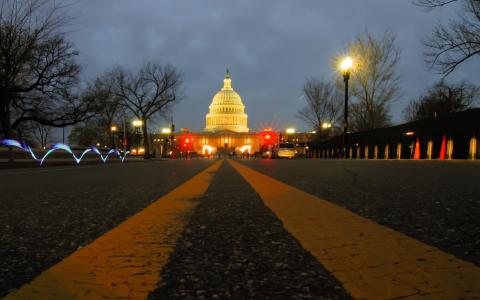
(The Hill) - Rep. Alexandria Ocasio-Cortez (D-N.Y.) argued Thursday that passage of both pieces of President Biden’s sweeping economic agenda is an “absolute, bare minimum” for fighting inflation.
In a Twitter thread, Ocasio-Cortez said that both the bipartisan infrastructure bill and the broader social services and climate package would make it easier for the U.S to overcome several pandemic-related supply constraints and hiring issues.
“If you are worried about inflation, it’s important to understand why it’s happening: supply chain, labor, and healthcare complications. We can address these issues by investing in infrastructure, wages, healthcare [and] benefits,” tweeted Ocasio-Cortez, a member of the House Financial Services Committee.
“AKA signing BBB/BIF into law as absolute, bare minimum,” she continued, referring to the larger $1.7 trillion “Build Back Better” measure and the Bipartisan Infrastructure Framework, shorthand for the smaller bipartisan roads and bridges package, respectively.
House Democratic leaders are attempting to pass both bills as soon as this week, with the ultimate goal of bringing the total package to Biden’s desk by Thanksgiving.
While the Senate has already passed the bipartisan infrastructure bill, House progressives have refused to back the measure without assurances from moderate Senate Democrats, such as Joe Manchin (W.V.), that they’ll support the more expansive part of Biden’s agenda as well.
But Manchin and several moderate House Democrats have expressed concerns about voting on the social services and climate bill without a clearer picture of its impact on the national debt and inflation.
The consumer price index (CPI), which tracks price growth for a wide range of household staples, rose 0.4 percent in September and 5.4 percent annually. Prices have risen sharply this year due largely to consumer demand bouncing back to life while the delta variant severely hindered the ability of supply chains to keep up.
Job growth also fell off sharply after the emergence of the delta variant, exacerbating hiring troubles for businesses in the hard-hit service sector and putting upward pressure on wages.
Republicans have pinned rising prices and the worker shortage on Biden and Democrats, arguing that the $1.9 trillion March stimulus bill and proposed spending increases are overheating the economy. While robust fiscal and monetary support has likely fueled some of the inflation increase, a broad range of economists say it also fueled a quicker jobs recovery.
But Ocasio-Cortez countered that Biden’s agenda would help bring back more of the millions of workers who have yet to return to the labor force due to COVID-related fears or constraints. She cited several members of her family who were unable to work due to a lack of childcare and paid leave, two main targets of Biden’s social service plan.
“You will sometimes hear stories of a place claiming to have raised wages but still having trouble keeping people. Well, when a pandemic devastated intergenerational families of workers and there’s no childcare, people can’t go back to work,” she tweeted.
“I haven’t seen data yet if those anecdotes are indicative of a larger trend (& if so, how large), but the point still stands,” she continued. “When childcare isn’t universally available, it impacts the labor market. It can become a supply chain issue!"
Treasury Secretary Janet Yellen made a similar argument in a September speech, recalling how she may not have been able to return to teaching at the University of California, Berkeley without affordable childcare.
Roughly 6 million Americans wanted to work but were not currently looking for jobs in September, according to Labor Department data released last month, and another 1.6 million said they were unable to work due to a pandemic-related constraint. Most economists say that bringing those workers back into the labor market is a crucial step toward solving the supply chain issues driving inflation higher.
It could still be months before the combination of global COVID-19 outbreaks, port backlogs, trucker shortages and other supply chain snarls driving inflation begin to fade, and many of those factors are beyond the U.S. government’s reach. Even so, some economists believe Biden’s spending package is unlikely to spur higher inflation and may help reduce it by accelerating a full labor market recovery.
“Concerns that the plan will ignite undesirably high inflation and an overheating economy are overdone, as the fiscal support it provides will ensure the economy only returns to full employment from the recession caused by the COVID-19 pandemic,” Moody’s Analytics chief economist Mark Zandi and assistant director Bernard Yaros argued in a Thursday paper.
Zandi and Yaros explained that the tax increases on the wealthy and corporations included in the package would offset some of the stimulus from inflation while investments in infrastructure, lower child care costs and education could help expand the workforce and productivity.
“Passage of legislation remains uncertain, but failing to pass legislation would certainly diminish the economy’s prospects,” they wrote.
BY SYLVAN LANE
11/04/21



